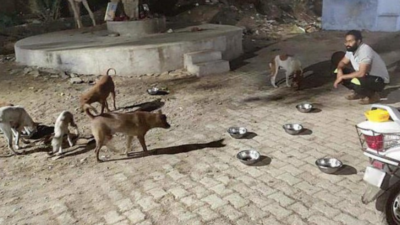- News
- Goa: Government departments pass the bark, housing societies run from pillar to post
Trending Topics
Goa: Government departments pass the bark, housing societies run from pillar to post

There is no clear strategy or roadmap to control the population of dogs
PANAJI: Even as housing societies, NGOs, and industry stakeholders have repeatedly been knocking on the government's door seeking a solution to the burgeoning stray dog menace, state departments have mostly dealt with the problem by simply transferring the responsibility to some other department.
While a coordinated approach is the need of the hour, there's no clear strategy or roadmap to control the population of stray dogs in Goa, a state which in 2021 reported 65.5 dog bite cases every single day. While laws in force state that this is the responsibility of village panchayats and municipalities, little to nothing has been done, with dogs continuing to "form packs and roam around like mobs", in the words of a top veterinary doctor.
To make matters worse, dog lovers, housing society representatives, and veterinary doctors discreetly admit that the Animal Welfare Board of India's (AWBI) animal birth control (ABC) programmes have largely failed. Although funding is available, the lack of intent coupled with poor coordination hampers the programme, said experts.
State departments have been waxing eloquent in circulars, letters, and instructions, even as nothing changes. In April 2021, the deputy collector for North Goa wrote to health authorities calling for a joint inspection due to the "danger of dog bites" along the Kadamba plateau.
Two months before that,
Canine conundrum in housing societies continues
When the North Goa deputy collector wrote to health authorities calling for a joint inspection due to the “danger of dog bites” along the Kadamba plateau, it came two months after the Registrar of Cooperative Societies issued a circular calling for a “coordinated approach” to manage the dog population. Another circular issued by the RCS noted “instances of dog bites” reported by various housing societies. The department then issued instructions to zonal officers, cooperative housing societies, and residents to take measures to keep a check on stray dogs. “A coordinated approach is required to deal with the dog menace in cooperative housing societies, and it was requested that the management of the cooperative housing societies be instructed to coordinate and cooperate to deal with the dog menace in the interest of the safety of residents,” then registrar of cooperative societies, Arvind Khutkar, had said.
Unsurprisingly, residents said that the more things change, the more they remain the same. Speaking about a petition to the district collector, a resident of Milroc Kadamba said, “Senior citizens were attacked, children were attacked, and that is what propelled us to write... It was a signature campaign and at least 100 residents signed the petition”. A senior veterinarian said laws should be framed in such a way that the ABC programme is streamlined. “State governments are loaded with money for ABC but the scheme does not set a target for sterilisation of dogs within a particular time in a particular area,” he said.
Mission Rabies’ director of education, Dr Murugan Appupilai, said that all these schemes should have allocation for education and awareness about ABC. “Education has to focus on the panchayats, the municipality, the officers, the vets, and the NGOs”. Meanwhile, Greg DMonte, who describes himself as a responsible caregiver of dogs, said that the problems in gated housing societies are due to violation of all laws, particularly about registration of pet dogs and strays. In April 2022, DMonte wrote to the district collector expressing concern about the large number of stray dogs in and around Harbans Vihar cooperative society.
The deputy collector wrote to the Chimbel primary health centre and called for a joint inspection and a report about concerns about dog bites. “We must be compassionate towards dogs and Article 51A(g) of the Constitution speaks about protecting and feeding animals, but it cannot be at the cost of human beings,” said DMonte. Stringent rules prohibit the relocation of aggressive strays, but housing societies have found a middle path by creating designated feeding areas within the colonies but which are away from the common areas.
While a coordinated approach is the need of the hour, there's no clear strategy or roadmap to control the population of stray dogs in Goa, a state which in 2021 reported 65.5 dog bite cases every single day. While laws in force state that this is the responsibility of village panchayats and municipalities, little to nothing has been done, with dogs continuing to "form packs and roam around like mobs", in the words of a top veterinary doctor.
To make matters worse, dog lovers, housing society representatives, and veterinary doctors discreetly admit that the Animal Welfare Board of India's (AWBI) animal birth control (ABC) programmes have largely failed. Although funding is available, the lack of intent coupled with poor coordination hampers the programme, said experts.
State departments have been waxing eloquent in circulars, letters, and instructions, even as nothing changes. In April 2021, the deputy collector for North Goa wrote to health authorities calling for a joint inspection due to the "danger of dog bites" along the Kadamba plateau.
Two months before that,
Canine conundrum in housing societies continues
When the North Goa deputy collector wrote to health authorities calling for a joint inspection due to the “danger of dog bites” along the Kadamba plateau, it came two months after the Registrar of Cooperative Societies issued a circular calling for a “coordinated approach” to manage the dog population. Another circular issued by the RCS noted “instances of dog bites” reported by various housing societies. The department then issued instructions to zonal officers, cooperative housing societies, and residents to take measures to keep a check on stray dogs. “A coordinated approach is required to deal with the dog menace in cooperative housing societies, and it was requested that the management of the cooperative housing societies be instructed to coordinate and cooperate to deal with the dog menace in the interest of the safety of residents,” then registrar of cooperative societies, Arvind Khutkar, had said.
Unsurprisingly, residents said that the more things change, the more they remain the same. Speaking about a petition to the district collector, a resident of Milroc Kadamba said, “Senior citizens were attacked, children were attacked, and that is what propelled us to write... It was a signature campaign and at least 100 residents signed the petition”. A senior veterinarian said laws should be framed in such a way that the ABC programme is streamlined. “State governments are loaded with money for ABC but the scheme does not set a target for sterilisation of dogs within a particular time in a particular area,” he said.
Mission Rabies’ director of education, Dr Murugan Appupilai, said that all these schemes should have allocation for education and awareness about ABC. “Education has to focus on the panchayats, the municipality, the officers, the vets, and the NGOs”. Meanwhile, Greg DMonte, who describes himself as a responsible caregiver of dogs, said that the problems in gated housing societies are due to violation of all laws, particularly about registration of pet dogs and strays. In April 2022, DMonte wrote to the district collector expressing concern about the large number of stray dogs in and around Harbans Vihar cooperative society.
The deputy collector wrote to the Chimbel primary health centre and called for a joint inspection and a report about concerns about dog bites. “We must be compassionate towards dogs and Article 51A(g) of the Constitution speaks about protecting and feeding animals, but it cannot be at the cost of human beings,” said DMonte. Stringent rules prohibit the relocation of aggressive strays, but housing societies have found a middle path by creating designated feeding areas within the colonies but which are away from the common areas.
Start a Conversation
FOLLOW US ON SOCIAL MEDIA
FacebookTwitterInstagramKOO APPYOUTUBE










